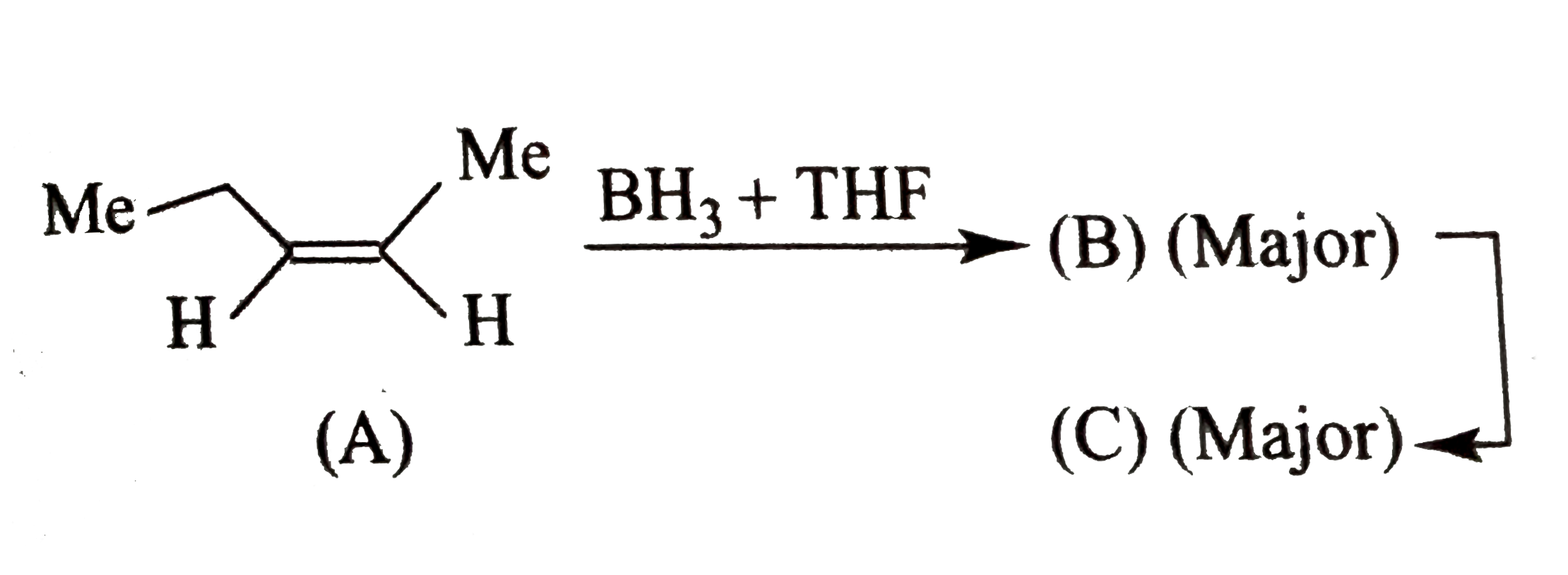B.P of H2O(100∘C)and H2S(≡42∘C) is explained by
Vander Waal's forces
Colvalent bonding
Hydrogen bonding
Ionic bonding
The correct Answer is:C
To explain the boiling points of H2O (100°C) and H2S (−42°C), we can analyze the intermolecular forces present in each compound.
Step 1: Identify the compounds and their boiling points
- Water (H2O) has a boiling point of 100°C.
- Hydrogen sulfide (H2S) has a boiling point of −42°C.
Step 2: Determine the types of intermolecular forces present
- Water (H2O): The molecule contains oxygen, which is highly electronegative. This leads to the formation of hydrogen bonds between water molecules.
- Hydrogen sulfide (H2S): The molecule contains sulfur, which is less electronegative than oxygen. Therefore, H2S primarily exhibits Van der Waals forces (also known as London dispersion forces), which are weaker than hydrogen bonds.
Step 3: Explain the significance of hydrogen bonding in water
- Hydrogen bonding is a strong type of dipole-dipole interaction that occurs when hydrogen is bonded to highly electronegative atoms like oxygen, nitrogen, or fluorine. In water, each molecule can form up to four hydrogen bonds with neighboring molecules, creating a strong network of interactions. This results in a higher boiling point due to the increased energy required to break these bonds during the phase transition from liquid to gas.
Step 4: Compare the boiling points based on intermolecular forces
- The strong hydrogen bonds in water lead to a significantly higher boiling point (100°C) compared to the weaker Van der Waals forces in H2S, which results in a much lower boiling point (−42°C).
Conclusion
The boiling point of H2O is higher than that of H2S primarily due to the presence of hydrogen bonding in water, which is absent in hydrogen sulfide.
Final Answer
The boiling point of H2O (100°C) and H2S (−42°C) is explained by hydrogen bonding.
---
- Water (H2O) has a boiling point of 100°C.
- Hydrogen sulfide (H2S) has a boiling point of −42°C.
- Water (H2O): The molecule contains oxygen, which is highly electronegative. This leads to the formation of hydrogen bonds between water molecules.
- Hydrogen sulfide (H2S): The molecule contains sulfur, which is less electronegative than oxygen. Therefore, H2S primarily exhibits Van der Waals forces (also known as London dispersion forces), which are weaker than hydrogen bonds.
- Hydrogen bonding is a strong type of dipole-dipole interaction that occurs when hydrogen is bonded to highly electronegative atoms like oxygen, nitrogen, or fluorine. In water, each molecule can form up to four hydrogen bonds with neighboring molecules, creating a strong network of interactions. This results in a higher boiling point due to the increased energy required to break these bonds during the phase transition from liquid to gas.
- The strong hydrogen bonds in water lead to a significantly higher boiling point (100°C) compared to the weaker Van der Waals forces in H2S, which results in a much lower boiling point (−42°C).
The boiling point of H2O is higher than that of H2S primarily due to the presence of hydrogen bonding in water, which is absent in hydrogen sulfide.
The boiling point of H2O (100°C) and H2S (−42°C) is explained by hydrogen bonding.
Topper's Solved these Questions
- BOOK - VMC MODULES ENGLISHCHAPTER - CHEMICAL BONDING & MOLECULAR STRUCTURE EXERCISE - IN-CHAPTER EXERCISE-I10videos
CHEMICAL BONDING & MOLECULAR STRUCTURE
- BOOK - VMC MODULES ENGLISHCHAPTER - CHEMICAL BONDING & MOLECULAR STRUCTURE EXERCISE - IN-CHAPTER EXERCISE-J10videos
CHEMICAL BONDING & MOLECULAR STRUCTURE
- BOOK - VMC MODULES ENGLISHCHAPTER - CHEMICAL BONDING & MOLECULAR STRUCTURE EXERCISE - IN-CHAPTER EXERCISE-G7videos
CHEMICAL BONDING & MOLECULAR STRUCTURE
- BOOK - VMC MODULES ENGLISHCHAPTER - CHEMICAL BONDING & CHEMICAL STRUCTURE EXERCISE - IMPECCABLE50videos
CHEMICAL BONDING & CHEMICAL STRUCTURE
- BOOK - VMC MODULES ENGLISHCHAPTER - CHEMICAL BONDING-I & IIEXERCISE - JEE Advanced (Archive)98videos
CHEMICAL BONDING-I & II
Similar Questions
Find the entropy change when 90 g of H2O at 10∘C was converted into steam at 100∘C.
[ Given CP(H2O)=75.29JK−1mol−1andΔHvap=43.932JK−1mol−1]View SolutionWhat volume of O2 at 2.00 atm pressure and 27∘C is requried to burn 10.0 g of heptane (C7H16) ?
C7H16+11O2→7CO2+8H2OView SolutionWhat volume of O2 at 2.00 atm pressure and 27∘C is required to burn 10.0 g of heptane (C7H16) ?
C7H16+11O2→7CO2+8H2OView SolutionOn mixing 1 mole of C6H6(P∘=42mm) and 2 mole of C7H8(P∘=36mm) one can conclude
View Solution2Ag++C6H12O6+H2O→2Ag(s)+C6H12O7+2H+ Find ln K of this reaction.
View SolutionWhich of the following is true fo the reacion H2O(l)⇔H2O(g) at 100∘C and 1 atmosphere
View SolutionDuring an electrolysis of conc H2SO4 , perdisulphuric acid (H2S2_(8)) and O2 are formed in equimolar amount. The moles of H2 that will be formed simultaneously will be
a.Thrice that of O2 b. Twice that of O2
c. Equal to that of O2. d. Half of that of O2View Solution H2O2+ΘOH
H2O2+ΘOH
B and C are:View Solution100cm3 of a given sample of H2O2, gives 1000cm3 of O2 at S.T.P. The given sample is
View SolutionThe reaction
2C2H5OHConc.H2SO4−−−−−−−−→140∘C(C2H5)2O+H2O
is an example ofView Solution
